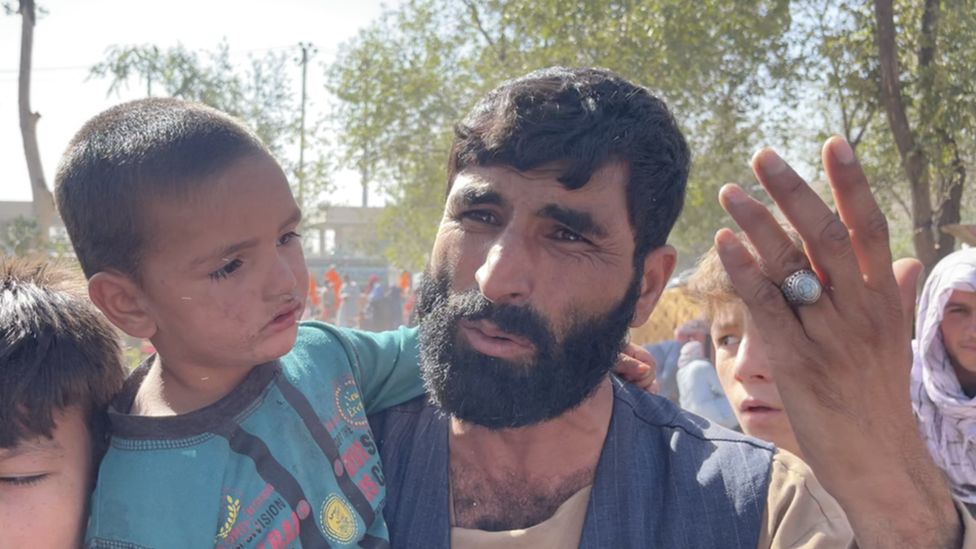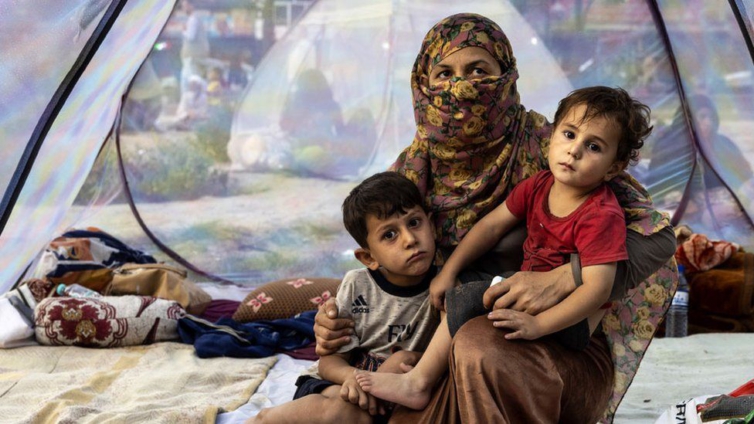
Audio By Carbonatix
The UN has urged Afghanistan's neighbours to keep their borders open as the number of civilians fleeing the Taliban onslaught swells.
Thousands of those internally displaced have been arriving in Kabul, seeing the capital as their last safe refuge.
Food shortages are "dire", the World Food Programme (WFP) said. It warned of a humanitarian catastrophe.
On Friday, the Taliban seized the country's second-largest city Kandahar, the latest provincial capital to fall.
The southern city of 600,000 people was once the Taliban's stronghold and is strategically important because of its international airport, agricultural and industrial output.
The insurgents also took the nearby city of Lashkar Gah, and now control about a third of Afghanistan's provincial capitals.
The advance comes as US and other foreign troops withdraw after 20 years of military operations. More than 1,000 civilians were killed in Afghanistan in the past month alone, according to the UN.
Sahraa Karimi, an Afghan filmmaker in Kabul, told the BBC it felt like the world had turned its back on Afghanistan and she feared a return to "dark times".
Life under the Taliban in the 1990s saw women forced to wear the all-covering burka, education restricted for girls over 10 and brutal punishments brought in, including public executions.
"I am in danger - [but] I don't anymore think about myself," Ms Karimi said. "I think about our country... I think about our generation: that we did a lot to bring these changes.
"I think about young girls... there are thousands of beautiful, young talented women in this country."

Many of those seeking safety in Kabul have been sleeping on the streets. About 72,000 children are among those fleeing to the capital in recent days, according to Save the Children.
"We have no money to buy bread, or get some medicine for my child," Asadullah, a 35-year-old street vendor who fled northern Kunduz province after the Taliban set fire to his home, told the BBC.
"All of our home and belongings caught fire, so we came to Kabul and pray to God to help us," added Asadullah, who is now with his family in Kabul.
Makeshift camps have been established on scrubland on the outskirts of the capital, while many others have reportedly been sleeping in abandoned warehouses.
Speaking to the BBC shortly before Kandahar fell, Pashtana Durrani, executive director of an education NGO that works with Afghan girls, said she was scared for her life because of her vocal role in advocating for women's education.
"The girls who we work with have already fled," she said. "I don't know where the students are and I'm personally scared about their life. What if they're married to a Taliban fighter? What will their life be like?"
Latest Stories
-
Ghana is rising again – Mahama declares
5 hours -
Firefighters subdue blaze at Accra’s Tudu, officials warn of busy fire season ahead
5 hours -
New Year’s Luv FM Family Party in the park ends in grand style at Rattray park
5 hours -
Mahama targets digital schools, universal healthcare, and food self-sufficiency in 2026
5 hours -
Ghana’s global image boosted by our world-acclaimed reset agenda – Mahama
6 hours -
Full text: Mahama’s New Year message to the nation
6 hours -
The foundation is laid; now we accelerate and expand in 2026 – Mahama
6 hours -
There is no NPP, CPP nor NDC Ghana, only one Ghana – Mahama
6 hours -
Eduwatch praises education financing gains but warns delays, teacher gaps could derail reforms
6 hours -
Kusaal Wikimedians take local language online in 14-day digital campaign
7 hours -
Stop interfering in each other’s roles – Bole-Bamboi MP appeals to traditional rulers for peace
7 hours -
Playback: President Mahama addresses the nation in New Year message
8 hours -
Industrial and Commercial Workers’ Union call for strong work ethics, economic participation in 2026 new year message
10 hours -
Crossover Joy: Churches in Ghana welcome 2026 with fire and faith
10 hours -
Traffic chaos on Accra–Kumasi Highway leaves hundreds stranded as diversions gridlock
10 hours

